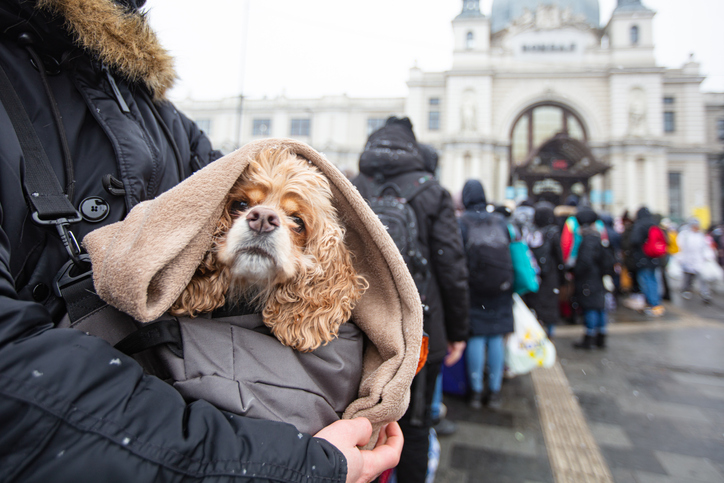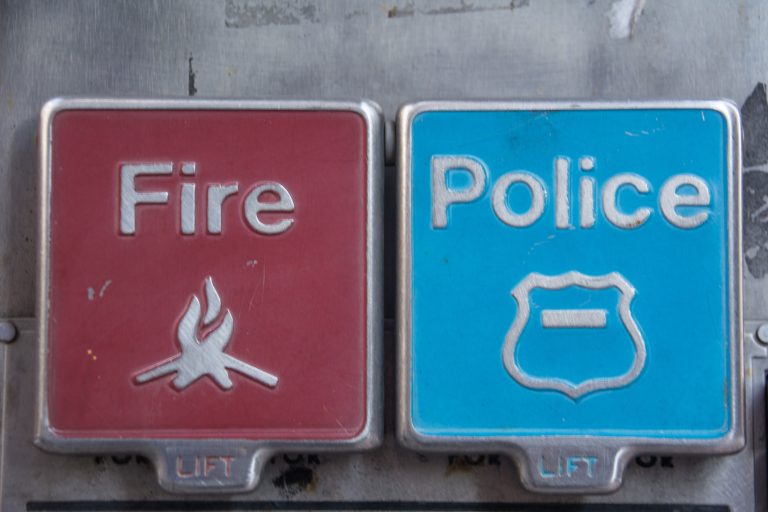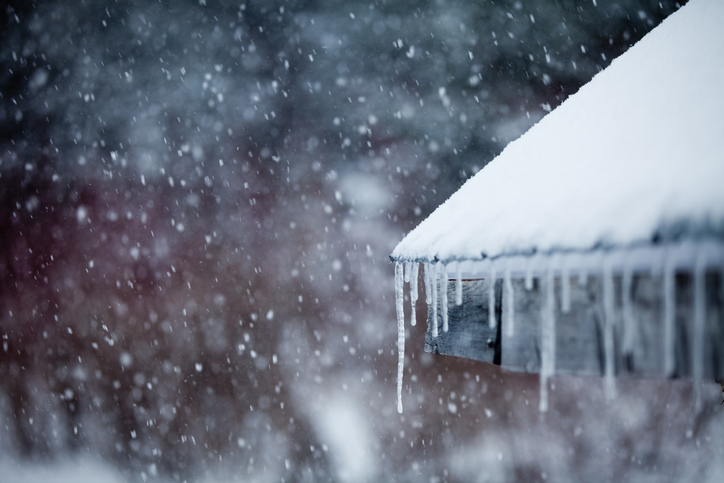Wise Giving Wednesday: Ukraine Pets and Animals in Wartime

BBB Wise Giving Alliance is pleased to release the fourth entry in a series of posts by Kateryna (Katya) Zhuk. Katya heads a Ukraine charity monitoring organization, Charity Tuner. This organization, along with BBB Wise Giving Alliance, is a member of an association of standards-based charity monitors from around the world.
Ukraine Pets and Animals in Wartime
By Kateryna Zhuk
After terrible announcements about the latest destruction from bombings, Ukrainian media, from national to small regional channels, tell stories about pets rescued from the rubble.
Ukrainians crossed the entire country with dogs, cats, ferrets, guinea pigs, and parakeets. The most in-demand assistance at the border with Poland, right after diapers, were portable animal carriers. Alongside hygiene supplies, free veterinary assistance points were opened at the central station in Warsaw and other Polish cities – with a doctor, vaccinations, and all necessary items.
“We had to run. But my cats got scared of the loud sounds (from the bombs) and we couldn’t catch one of them. We took three, and the volunteers later found one! I am so happy, I was afraid he had died.” I have heard dozens of such stories about how volunteers later handed over animals to their owners. Unfortunately, not all Ukrainian pet stories have a happy ending.
Volunteers
Cats and dogs are not only part of the typical Ukrainian family but also are part of the daily landscape. Even before the war, Ukraine had a huge number of stray cats and dogs. In parks, on the streets, among garages, near stores, and in the basements of buildings, near heating pipes. There are tens of thousands of homeless animals.
For years, animal volunteers have been trying to find homes for them, spaying and neutering them at their own expense, microchipping them, and protecting them from cruelty. Not long before the war, activists managed to push through a Ukrainian regulation with strict punishment for animal abuse, and they also succeeded in opening basements where cats could find warmth and survive the cold winter.
With the start of the war, homeless pets found themselves in cities without people, and therefore without food. Volunteers began to make efforts to feed all the animals they encountered along their way. This can only be done with resources.
Zoo volunteer Olga Ivanova, from the first days of the war, went out on the streets to feed not only the cats near her apartment building, as she used to do before, but also went through the private sector and industrial zone: “Many people tried to leave by train or bus, and their pets were left behind at the stations when their owners could barely squeeze into the overcrowded transportation. Pedigree dogs with dragging leashes or clearly frightened domestic cats, who couldn’t move from under the house due to fear of shelling, became a common sight.“
“Also, most stores, including specialized stores, online stores, or stores with large warehouses, closed. In addition, problems were caused by the lack of transportation and lockdowns, when you couldn’t go out for a day and a half. We had to walk around the neighborhood in search of an open retail chain or a store with feed.
“At that time, we started a fundraising campaign for Kyiv street animals who were living through wartime with us. We received small amounts of money from all over Ukraine, and it was enough to get us through the day. In the morning, we would go out in search of open shops, make purchases, and then return home on foot, feeding animals along the way where we saw them or whoever came to our call. We walked 12-15 kilometers a day, and the cats would come out in whole prides of 8-10 animals. Gradually, the situation began to improve when aid from foreign countries began to arrive in Ukraine, and the animals were fed from our hands.”
Dmitry Podturkin, co-founder of the publication “Petro and Mazepa”, animal volunteer, head of the foundation, “From the first days of the war, we organized a volunteer headquarters, searched for and purchased cages and feed… The slogan of our project “Four-Footed Santa” was “We help those who have no one else to support”. We delivered help to the pets of elderly people and people with disabilities.”
There were also unique missions, such as saving animals from hunger in the Mena Zoo when it was cut off from the rest of the country and the corresponding supplies.
Animal Welfare Funds
Lyudmyla Yenzhievska, head of the trusted Happy Paw Foundation, said “Many shelters near Kiev, which we helped, found themselves under occupation. Buildings and cages were burning from shelling, animals were dying from bombing and heartbreak. All we asked for was to open the cages, whatever happens. There was no feed, nothing to bring in. Shelters were calling us 24/7 with requests to help us find food for their pets.
“On the positive side, the number of donations increased several times. They trust us, so they started to help us more actively, people understood that all the help would go to certain needs.
“The most basic thing right now is rebuilding shelters. So that it is possible to catch animals, put them in normal conditions, treat them, sterilize them, rehabilitate them, and find them a new home. One of our main criteria for working with shelters is family placement.”
One of the problems, is the incredible collections with the use of bloody photos of suffering animals (especially in the first days of the war or after the Kakhovska dam was destroyed). No one knows where this money goes in the end. In most cases, it’s a scam.
Staying Positive. Mutual Aid International for Exotic Pets
Last March, I tried to organize the purchase and transfer of cages in Ukraine to animal relief funds. I called others, discussed what was best to buy, and suddenly I was told to stop. I was informed there are many people in Poland who care, just provide a contact to send the cages to. Iin a few days a dozen cat and dog carriers were sent from Krakow to the evacuation volunteers. But it’s cats and dogs. What do you do if you have exotic animals living with you – a favorite parrot, rats?
My friend Lena, a parrot owner, told me about her adventures: “I left Kyiv with Jie, my caique (those crazy funny hopping and marching mid-sized parrots), four weeks after the full-scale Russian invasion of Ukraine started. I was never going to, but my mental health got severely worse, and city pharmacies ran out of my meds without hope of replenishing stocks in the near future. My doctors literally pushed me out. Leaving Jie behind was never an option.
“For days on the road, Jie stayed in a tiny carrier. In Przemysl, Polish volunteers found a small cage — a 3-star hotel with food, water, and toys! Jie lived in it for a week while I tried to find a larger cage I could afford. Near Poznan, we settled with my friend and her two rats, whom our Polish hosts fetched a villa-class cage. We laughed we’re a refugee zoo. Beating her species’ nature, Jie grew tough and changed the callsign “Eagle” (from our bomb shelter mates in Kyiv) to a full name Javelina.
“So, I wrote a post on Jie’s insta, and wow — in a few days, I got a cage! The Polish Association for the Welfare of Exotic Birds made this happen. People from the Association delivered and helped set up a new cage, also bringing food, toys, and treats. Many more people from the “parrot” community all around the world offered help, sent money, and were ready to order anything we needed. The Association continues to provide help to Ukrainian refugee birds in Poland.”
The European Union has introduced strict rules on the import (and transportation) of pets. Many Ukrainians in Poland already faced the need for international passports, urgent vaccination, and treatment after the move. My cat, for example, experienced such stress that he became sick and had to be treated with antibiotics for a week. Veterinary clinics that accept animals free of charge came to the rescue.
I really hope that this help to refugee animals will continue as some countries have rules that put animals to sleep (kill) that have a wrong document. That is, you save yourself, your loved ones, your pets, go through several borders and countries, and at the last moment your favorite cat can be “put to sleep.” This is a nightmare.
Wild Animal Rescue
Kyiv Animal Rescue Group (KARG) has been going on calls for years – taking a cat out of a tree, unleashing a bat, breaking into a basement or sewer, moving a bird’s nest or taking an injured fox to the vet. I have been following their activities for many years and have heard dozens of unique stories. When residents of the region found any dangerous situation for an animal, they called KARG, not the municipality. Crows, owls, falcons, storks, animals hit by cars, dogs pulled out of swamps, beavers, moose, hedgehogs… All were rescued and sent for treatment to zoos or shelters or veterinary hospitals with the support of zoo volunteers.
“We really need help with equipment and gasoline, financing of the salary fund. People who are not indifferent (who still have a job, who are able to do so today) help us. After a trip to Bakhmut last winter, we announced a fundraiser and bought an evacuation bus. After the explosion on the dam we urgently bought boats and motors for them. For now, we are asking everyone who comes to us for help on a routine basis to contribute some amount to continue our activities. Out of dire need – our vehicles are very worn out”
Not surprisingly, they were the first to rescue animals from the war zone. They evacuated from Bakhmut and rushed to the flooded Kherson region for professional help without payment. Rescued animals were transferred to the shelter, from where the owners could then take their pets. This is an important activity since not everyone did this, and many owners lost their cats and dogs forever according to eyewitnesses.
The war has also shown how much help is needed in free sterilization of animals and changes in legislation. Uncontrolled breeding of animals at home – even before the war there were hundreds of abandoned pets on the street, and now it is a disaster.
Shelters
There are a lot of private animal shelters in Ukraine. Municipal shelters are generally poor, animals live in terrible conditions, in spite of municipal financing (from local taxes) there was little control on the part of the authorities. Some private shelters never reported, which raised questions not only for me, but also for those who wanted to help. Some of them gave away animals only after fulfilling ridiculous (from the point of view of Western animal owners) requirements – special bars on the windows, only one animal allowed in the house, etc.
Animals can be sitting in a shelter for months, unaccountable money is collected for them, and the shelter posts photos and posts on social networks. That’s why I encourage people to consider the following before they donate.
- Ask how the shelter handles animal adoptions (rules, speed, promotional campaigns).
- Use your experience with your own pet’s expenses (quantity of food, etc.) in reviewing financial information on the shelter.
- Look at available public records on their finances, cleanliness, repairs.
- See if the shelter cooperates with other organizations and animal volunteers.
- Consider the volume of social media concerns and comments that may be posted about the shelter.
Kateryna Zhuk
Warsaw, Poland
September 5, 2023
Illustration – Used with permission from Ukrainian artist Maya Dvalishvili (https://instagram.com/dvali_?igshid=OGQ5ZDc2ODk2ZA== )
Links for donations:
Happy Paw https://happypaw.ua/en/contribution
Kyiv Animal Rescue Group https://www.paypal.com/donate/
Humanitarian help by Dmytro and Zoya donate@petrimazepa.com
Uanimals https://uanimals.org/en/
Note from BBB Wise Giving Alliance:
The links to charitable organizations listed above were compiled by the author, Kateryna Zhuk. Since these organizations are not located in the United States, contributions from Americans may not be deductible as charitable donations for federal income tax purposes. BBB Wise Giving Alliance has not evaluated these charities and has not determined whether they meet the BBB Charity Standards. In addition, the views, information, or opinions expressed in this piece are solely those of Kateryna Zhuk and do not necessarily reflect the views of BBB Wise Giving Alliance and its employees.
Heart of Giving Podcast
This week’s Heart of Giving Podcast features an interview with Jamie Horst, Chief Purpose Officer, Traditional Medicinals. Jamie Horst manages the company’s sustainability efforts and shares information about Traditional Medicinals’ philanthropic activities.
Recent Reports
We are always working with charities to publish or update reports for donors. Visit Give.org or local BBBs to check out any charity before giving. Our recently evaluated charities include:
Finally, remember to let us know by going to give.org/charity-inquiry if you are interested in seeing a report on a charity not on the list and we will do our best to produce one.


